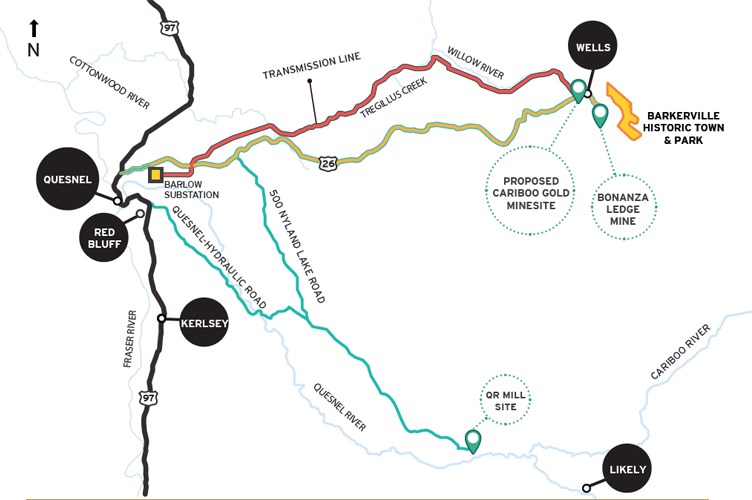Billy Barker may be back in business.
Last month Barkerville Gold Mines Ltd. applied to the B.C. Environmental Assessment Office for approval to build a new underground gold mine in the District of Wells. The proposed mine would employ roughly 250 people during the two-year construction period and 460 people during the 16-year life of the mine, Barkerville Gold Mines vice-president Chris Pharness said during a presentation to the Regional District of Fraser-Fort George board on Thursday.
"Our goal is to hire as many local people as we can," Pharness said. "We're preparing to do a lot of training."
People with work experience in the forestry section are a natural fit to transition into mining, he added.
Currently the company employs many underground miners from Saskatchewan at its operations, Pharness said, but they hope to take advantage of government training funding to train people from Wells, Quesnel and Prince George to work at the proposed Cariboo Gold Project mine. The majority of the employees at the mine will work on a two-weeks-in, two-weeks-out schedule, and live in a planned 200-person camp on site when working.
The proposed mine site is just southwest of the Wells townsite, between Wells and Jack of Clubs lake – roughly eight kilometres from the Barkerville Historic Town and Park.
The Cariboo Gold Project is expected to be a "low-environmental impact" project, Pharness said.
"All of these sites are previously-disturbed, with the exception of our transmission line," Pharness said.
The mine site has already been disturbed by a historic gold mine, and the waste rock will be stored at the existing Bonanza Ledge Mine, located four kilometres away. Pharness said the company is looking to relocate and preserve a mine head building dating from the 1930s on the site.
The company plans to upgrade the existing Quesnel River (QR) Mill, and haul the ore 115 km from the mine to the mill, located 20 km northwest of Likely. The project will use existing roads, he added, including a section of Highway 26, Nyland Lake Road, Quesnel Hydraulic Road and 2700 Road.
"With the QR Mill, there is an existing tailings storage facility," he said.
The existing tailings facility is a tailings pond, he said, similar to the one used at the Mount Polley mine that failed dramatically in August 2014, spilling contaminated water into Polley Lake and Hazeltine Creek.
When they upgrade the mill, they plan to upgrade the tailings storage facility to a "dry-stack" facility, he said.
The water will be treated and drained from the tailings pond.
"We take the water out of the tailings, then make clay-like bricks and stack it," Pharness said. "The idea is you're not maintaining dams with water behind them."
The tailings bricks are covered with a clay cap and soil, then replanted – creating a landform similar to a natural hill, he explained.
A 69-km-long high-voltage transmission line linking the mine to the Barlow Substation, near Quesnel, is proposed to power the mine operations.
The project is estimated to cost $306 million, and Barkerville Gold Mines hopes to receive regulatory approval in 2021 and begin construction in 2022, with mine operations to begin in 2024 and run until 2040. Once the deposit is exhausted, there will be a two-year reclamation period to close the mine.
"The geologists think there could be more than 16 years there," Pharness said.
Once work begins underground, they'll be better able to determine the extent of the gold deposits on the site, he said.
"I'm sure it's pretty exciting for the District of Wells and Cariboo Regional District," regional district chairperson Art Kaehn said. "I'm sure the benefits will ripple out our way."
The company has been engaging with, and plans to continue to work with the community and local Indigenous groups, Pharness said.
On Thursday, the company signed an agreement with the Lhtako Dene Nation for the life of the project.
“The Cariboo Gold Project is located within the territory (the Lhtako Dene Nation) have traditionally used and occupied,” Lhtako Dene Chief Cliff Lebrun said in a press release. “The protection of the land, water, resources and our way of life has guided our negotiating team. This agreement confirms our relationship with (Barkerville Gold Mines), to ensure we will work together to provide meaningful training, employment and business opportunities for (Lhtako Dene) people."
The deal also includes provisions for the First Nation to participate in the economic opportunities created by the project, Lebrun said.



